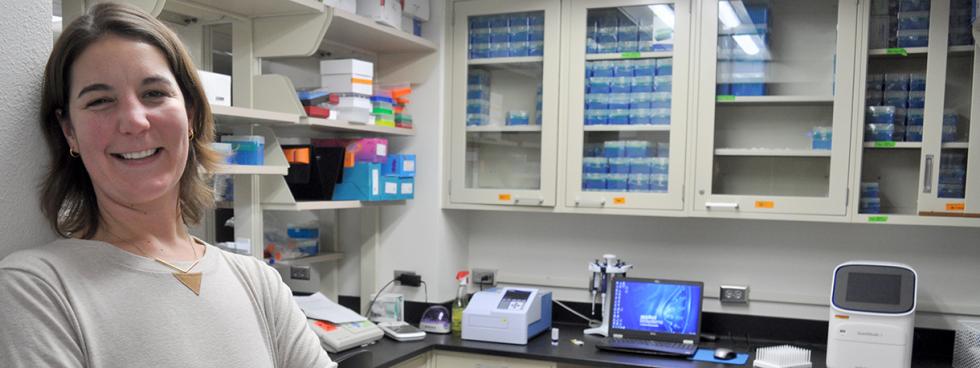
Hitting the Ground Running
One after another the grants kept streaming in.
“It was a crazy summer,” said Dr. Jodi McGill, assistant professor of veterinary microbiology and preventive medicine. “We had a bunch of things we were working on that all just clicked at the same time.”
The grants have been rolling in since January. There was $229,500 from the National Institutes of Health, $475,000 from the USDA, another $536,000 from the NIH. She also received significant support from private companies and universities.
And most recently, she received a $350,125 grant from the Roy J. Carver Charitable Trust out of Muscatine, Iowa, to research novel intervention strategies to address Vitamin A deficiency, mucosal immunity and human respiratory syncytial virus (RSV).
“I’m usually ‘scraping’ to put money together so to hit a critical mass with our preliminary research results and have this many grants all at once is definitely overwhelming,” McGill said.
The influx of grants has impacted McGill’s day-to-day operation. When she joined the College of Veterinary Medicine faculty in May 2018, the lab consisted of two individuals.
Today the lab is an “army” of seven plus several Iowa State undergraduate students.
“We’ve had to ramp up our efforts and hire several new people in the lab,” McGill said. “We have a new post-doc, a new technician and are working on recruiting some new graduate students.”
McGill’s background is in human immunology, completing her PhD from the University of Iowa. But there was a time in McGill’s career when she doubted if she would continue
in research.
“I got burned out, left research for a year and started working at the National Veterinary Services Lab,” she recalled. “Then a post-doc became available at the NADC (National Animal Disease Center) and I realized I loved working with cattle and I started to enjoy research again.”
McGill’s research focuses on the immune response to respiratory infections in cattle. Her lab is currently studying the response to several respiratory pathogens including bovine respiratory syncytial virus, Mannheimia haemolytic and Mycobacterium bovis, the causative agent of bovine and zoonotic tuberculosis.
Major projects are focused on the importance on nonconventional T cells in the response to respiratory infections, the development of novel vaccine strategies to prevent respiratory disease and investigating the impact of certain micronutrients on the host immune response and resistance to respiratory infection.
McGill’s Carver Trust grant looks at both animal and human health issues concerning RSV. RSV is a leading cause of severe acute lower respiratory tract disease in infants and young children worldwide. Bovine RSV (BRSV) is genetically and antigenically closely related to human RSV and a significant cause of morbidity in young cattle. The disease in cattle is very similar to that seen in humans, and the project will study the immune response in the calf to learn more about how the infection impacts human infants.
“This research allows me to have a foot in both the human and animal health worlds,” McGill said. gd
November 2019
